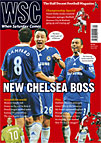 Arash Haghighi reports on how discussion of alleged corruption has led to the Iranian Match of the Day almost being taken off air
Arash Haghighi reports on how discussion of alleged corruption has led to the Iranian Match of the Day almost being taken off air
Broadcast nationally on Monday evenings, 90 is the Iranian version of Match of the Day. Until recently the only controversies it concerned itself with were decisions about borderline penalties and sendings off. Recently, however, officials from the Ministry of Sport became so enraged by the programme that they attempted to cancel it altogether. The cause of their resentment was the show’s producer and main presenter, Adel Ferdosipour, who has not been afraid to ask awkward questions about alleged corruption in Iranian football.
Every week 90 conducts a text message poll among its viewers. During one broadcast in late January, text messages to the TV studio were blocked. After that night, the press was full of articles supporting the programme and discussing the consequences for the government if it was taken off the air. All of a sudden football became a national issue.
For many people in Teheran the single biggest concern is the way that state officials have become involved with running one of the city’s two main clubs, Persepolis. After the revolution the club’s name, which derives from the ancient capital of the Persian empire, was changed a couple of times at official insistence. They are now called Pirouzi (Victory) but supporters still use the old name.
Persepolis have always been perceived as the leftist team in Teheran but in recent times the political establishment has attempted to co-opt them, notably when several government appointees were brought on to the board of directors. By contrast Esteqlal, who were known as Taj (Crown) before the revolution, were once the favoured team of the Shah and are still associated with the political right.
Every four years there is a presidential election in Iran, with the next poll due later this year. In the last year of each period, the incumbent government has tended to make a show of allocating state funds to both the main Teheran teams. But Persepolis have been beset by internal rifts this season, in which they have employed three coaches as well as losing their main striker, Mohsen Khalili, to injury. Government officials therefore seem to have decided to focus their attentions on Esteqlal. Adel Ferdosipour never referred directly to match fixing on 90 but he did make a point of highlighting some unusual refereeing decisions in Esteqlal’s favour.
On February 2, a week after the text messages had been blocked, 90 went on air for what many believed would be the last time. The viewers’ poll that night asked simply: “Do you agree with 90’s attitude toward football or not?” More than 2,500,000 supportive messages were received, a record in the history of television in Iran. Football seemed to have united Iranians in a common cause, a fact that was not lost on the government – the programme was duly reprieved.
There also seems to have been a knock-on effect. Persepolis midfielder Ali Karimi, once of Bayern Munich and a former Asian Footballer of the Year, subsequently complained in the press that club director Abbas Ansarifard was looking to appoint a foreign coach so that he could receive a “commission” from the coach’s agent. Karimi suggested that instead Ansarifard should be focusing on basic issues such as improving the club’s training facilities and making sure that the players were paid on time. Karimi’s comments generated widespread media support but it was widely assumed that this outburst would lead to him being sacked.
The player himself seemed to expect it, saying in a post-match TV interview: “I know there’s no going back, so maybe I will have to retire. But I said what I had to say and I can’t do anything more than that.” To general surprise his adversary, Ansarifard, reacted calmly, saying that was all a misunderstanding and that Karimi had spoken in the heat of the moment. It would seem that the authorities have decided that they can’t risk further outbursts of popular anger by picking a fight with the nation’s favourite team. Football may yet have a bigger role to play in the political process.
From WSC 266 April 2009